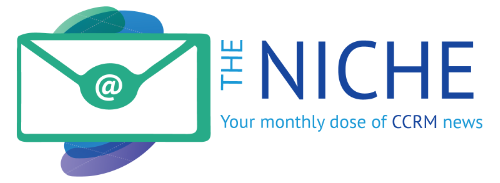The Centre for Commercialization of Regenerative Medicine (CCRM) is committed to ensuring equal access and participation for people with disabilities. We are committed to treating people with disabilities in a way that allows them to maintain their dignity and independence. We believe in integration and we are committed to meeting the needs of people with disabilities in a timely manner. We will do so by removing and preventing barriers to accessibility and meeting our requirements under the Accessibility for Ontarians with Disabilities Act (AODA) and Ontario’s accessibility laws.
This policy has been prepared to outline what clients, employees and the public may expect of CCRM, and ensures compliance with the AODA legislation. We make reasonable efforts and use all means at our disposal to ensure that the information or service requested is provided in a manner that is consistent with the principles of independence, dignity and equality.
This policy applies to all full-time, part-time and contract employees; employees working with CCRM through an agency or external parties and vendors; and, consultants and independent contractors who interact with members of the public on behalf of CCRM.
Disability: For the purpose of this policy, the term “disability” includes:
- Any degree of physical disability, infirmity, malformation or disfigurement that is caused by bodily injury, birth defect or illness and, without limiting the generality of the foregoing, includes diabetes mellitus, epilepsy, a brain injury, any degree of paralysis, amputation, lack of physical co-ordination, blindness or visual impediment, deafness or hearing impediment, muteness or speech impediment, or physical reliance on a guide dog or other animal, or on a wheelchair or other remedial appliance or device;
- A condition of mental impairment or a developmental disability;
- A learning disability, or a dysfunction in one or more of the processes involved in understanding or using symbols or spoken language;
- A mental disorder; or
- An injury or disability for which benefits were claimed or received under the insurance plan established under the Workplace Safety and Insurance Act (Ontario).
Employee: For the purposes of this policy, the term “employee” refers to any person whom CCRM pays wages or a salary, has control over their assigned work and has a right to control the details of their work. This includes, but is not limited to:
- Full-time employees
- Part-time employees
- Contract employees
Service Animal: For the purposes of this policy, an animal is a service animal for a person with a disability:
- If it is readily apparent that the animal is used by the person for reasons relating to his or her disability; or
- If the person provides a letter from a physician or nurse confirming that the person requires the animal for reasons relating to the disability.
“Service animal” also includes a guide dog as defined under the Blind Persons’ Rights Act, Section 1.
Support Person: For the purposes of this policy, a “support person” is a person who accompanies a person with a disability to help with communication, mobility, personal care or medical needs or with access to goods or services. The support person could be a paid personal support worker, a volunteer, a friend or a family member. They do not necessarily need to have special training or qualifications.
Procedures
Communication with Persons with Disabilities
We will communicate with people with disabilities in ways that take into account their disability. When asked, we will provide information about our organization and its services, including public safety information, in accessible formats or with communication supports.
We are also working towards meeting internationally-recognized Web Content Accessibility Guidelines (WCAG) 2.0 Level AA website requirements by January 1, 2021, in accordance with Ontario’s accessibility laws.
Notice of Temporary Disruptions in Services and Facilities
In the event of a disruption in the services used by people with disabilities, CCRM will post alternative format notices in conspicuous locations including, but not limited to, public entrances and reception areas.
This notice will include the following information:
- The reason for the disruption
- Its anticipated length of time
- A description of alternative facilities or services, if available
- Contact information
When possible, every effort will be made to reduce disruption to individuals with disabilities that use CCRM’s services or facilities by contacting them and/or arranging alternate meeting/work locations or alternative means of accessing CCRM information.
Assistive Devices and other Measures that Assist with Accessibility
People with disabilities may use personal assistive devices to help them with daily living. They include any assistive aids such as communication aids, cognition aids, personal mobility aids and/or medical aids. Members of the public who are disabled usually bring these devices with them.
We will ensure that our staff is trained and familiar with various assistive devices that may be used by fellow employees, clients, or visitors with disabilities while accessing CCRM’s services. We will always ask before assuming assistance is required.
Service Animals
We welcome people with disabilities and their service animals. Members of the public with varied disabilities utilize service animals to overcome barriers. Service animals are not pets – they are working animals. A few examples of service animals include dogs used by people who are blind, hearing alert animals for people who are deaf or hard of hearing, and animals trained to alert an individual to oncoming seizure and lead them to safety.
We will permit any person with a disability who is accompanied by a guide dog or other service animal to enter CCRM’s premises, to the access level authorized for the individual. When it is not readily apparent that the animal is a service animal, we may ask to see documentation to ensure that the animal brought on the premises is a certified service animal.
Support Persons
A person with a disability who is accompanied by a support person will be allowed to have that person accompany them on CCRM’s premises (those areas open to the public) and we will ensure that the individual needing the support person will have access to this person at all times.
Employment
We will notify potential hires and the public that accommodations can be made during recruitment and hiring.
We will notify staff that supports are available for those with disabilities. We will put in place a process to develop individual accommodation plans for employees.
Where needed, we will also provide customized emergency information to help an employee with a disability during an emergency. Our performance management, career development and redeployment processes will take into account the accessibility needs of all employees.
Training and Awareness for Staff
We are committed to providing training and awareness on the standards and expectations of the Integrated Accessibility Standards of the AODA to all employees as it relates to their specific roles, as soon as practicably possible after an individual joins CCRM.
Training and awareness may include, as appropriate:
- An overview of the AODA (2005) and the requirements of client service standards
- How to interact and communicate with people with various types of disabilities
- How to interact with people with disabilities who use an assistive device or require the assistance of a service animal or a support person
- What to do if a person with a disability is having difficulty in accessing CCRM’s services
- CCRM’s Multi-Year Accessibility Plan related to client service standards
If any changes are made to CCRM’s policies and/or Accessibility Plan, staff will receive an updated physical and/or digital copy to review, as required. For more information on accessibility in Ontario, visit the Ministry of Community and Social Services website: www.accesson.ca.
Feedback Process
We welcome your feedback about accessibility for people with disabilities at CCRM. Any feedback, including questions, concerns, comments or compliments, will be followed up on within ten (10) business days of receipt, depending on the situation.
Please direct your feedback via email to info@ccrm.ca. Your comments will be reviewed and forwarded to the appropriate department for follow-up and response.
Availability and Format of Documents (Alternative Formats)
We are committed to providing accessible information and communication to our clients and recognize that people with disabilities often use methods other than standard print to access information. We will provide any publicly available correspondence, reports and other documentation in an alternative format where reasonably possible, upon request.
All reports, and other documents distributed to the public, will indicate that alternative format documents are available upon request.
Types of alternative formats available:
- Hard copy or e-mail
- Large print
If another format is requested, CCRM will do what is reasonably possible to ensure that information is shared within a reasonable time frame, no longer than twenty (20) business days.
Approval
_
 ____________________________
____________________________Michael H. May, PhD
President and CEO December 19, 2017
Effective Date

